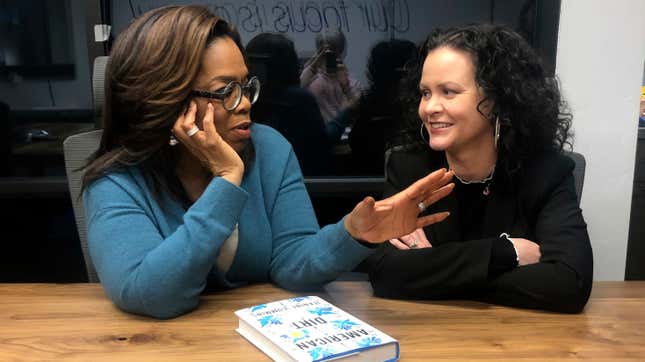Oprah Winfrey's Empathetic, Ignorant Approach to Immigration
Latest

When the controversy over Jeanine Cummins’s novel American Dirt first started to take shape, Oprah Winfrey positioned herself as a mediator between the work’s detractors and the book itself. Cummins, a white woman who identifies as Latina (she says she is a third-generation Puerto Rican), wrote a romanticized story about a woman migrating from Mexico to the U.S. that sparked outrage among Latinx communities for its use of stereotypes and its whitewashing of Mexican culture.
Oprah, on the other hand, was so strongly moved by the book that she added it to her book club—an endorsement that typically sends sales skyrocketing—and has been defending it since its release date. After the book’s release prompted a barrage of Twitter comments, a petition, and the formation of the Latinx authors activist group #DignidadLiteraria, Oprah promised that she would have a discussion, which would include “voices from all sides.” That discussion went live on Apple TV+ last week as a two-part special and includes two episodes. The first is devoted to a discussion with Cummins and three Latinx writers about critiques of the book, although the voice of Myriam Gurba, whose critique of the book spearheaded this reckoning, is painfully absent. The second episode, likely intended as a helpful primer on immigration, comes off as an afterschool special—an introductory lesson to the crisis designed by Oprah. The show comes in at around two hours but it certainly doesn’t take that much time to fully understand the depth of Oprah’s willful ignorance.
Though the first episode purports to discuss American Dirt’s framing as a quintessential immigrant story, participants—which include Reyna Grande, Julissa Arce, and Esther Cepeda, three Mexican authors who have previously written on immigration—weren’t given much time to devote to that task. Winfrey’s defense of the book shifted the blame toward its publishers: Representatives from Macmillan Books and Flatiron Books, the publishing house and imprint responsible for printing and creating the book jacket for American Dirt, were conveniently seated in the front row of the audience ready to apologize and grovel. Cummins told Winfrey that she regretted using the term “faceless brown mass” in the novel’s afterword, one which has been repeated in the book’s reviews and rebukes. Grande, Arce, and Cepeda also spoke about the difficulties of getting their own works published—true stories of immigration, based on their own personal experiences—and a publishing industry that has “systematically silenced” Latinx voices by keeping them off the bookshelves.
Oprah is speaking to people like herself, who can watch news stories about family separation and ignore Them
While the conversation spent a great deal of time rightfully lambasting the publishing industry, it failed to address many issues with the book itself. There were moments of well-placed anger, like when Cepeda said she was frustrated that writers like Cummins could write anything, but writers with “our last names can only tell stories about immigration.” Of course, there was a sprinkling of apologies from Flatiron, for flavor. Any poignant questions that may have been directed at Cummins were left on the cutting room floor, and she sat pensively crafting response after response to distance herself as much as possible from the sins of her publishers. While Cummins voiced her regret to Winfrey, she delivered no apologies to her fellow authors. Nor were they offered to the members of the Latinx community at large, who have voiced their hurt over the book’s framing of immigration and depiction of Mexico. The panel seemed only able to agree on one fact: The problem is much larger than just Jeanine Cummins.
-

-

-

-

-

-

-

-

-

-

-

-

-

-

-

-

-

-

-

-

-

-

-

-

-

-

-

-

-

-

-

-

-

-

-

-

-

-

-

-








































